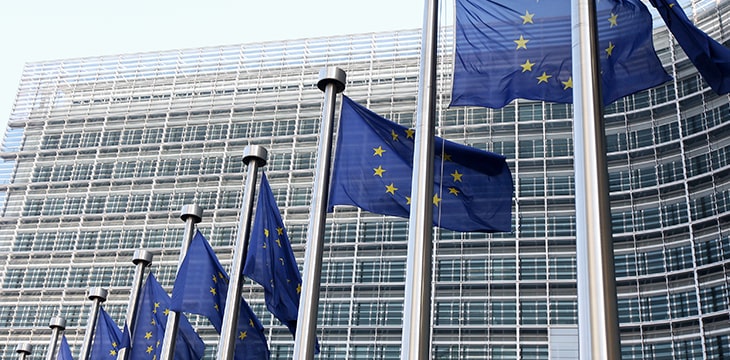|
Getting your Trinity Audio player ready...
|
Digital asset transfers may soon fall under greater surveillance in Europe—including those from “non-custodial” wallets held privately by users. Two European Union (EU) Parliamentary Committees have approved draft legislation to allow greater traceability and monitoring of blockchain wallet transactions that some say contain several “red flags” for privacy and digital asset usability.
The EU Parliamentary Committees on Economic and Monetary Affairs (ECON) and the Committee on Civil Liberties (LIBE) voted 93 to 14 (with 14 abstentions) on March 31, 2022, to approve the draft.
The draft is expected to go to a vote in the full European Parliament next week, and if passed, it will become law across the EU. Part of the Financial Action Task Force (FATF) series of proposals, it is part of a worldwide trend to increasingly monitor private transactions and prevent money-laundering and tax evasion.
Initially, the proposed rules required digital asset service providers to collect information on transfers to “unhosted” wallets. However, a late amendment to the draft inserted new wording that would demand them also to identify and verify the beneficiary (or user) of such wallets. This would include even wallets that do not belong to customers of that provider.
1/ I hate to ring the alarm bell again, but the EU Parliament leaves us no choice 🚨🚨
This time it concerns a crackdown on unhosted wallets in the upcoming crypto AML regulation (TFR).
The ECON committee vote is on Thursday and the draft includes some absolute red flags 👇
— Patrick Hansen (@paddi_hansen) March 26, 2022
In all versions of the legislation, service providers must also report any “suspicious” transactions. Under FATF’s “travel rule,” regulations apply to any fiat transaction over EUR1,000. However, this draft would apply that rule to all digital asset transactions.
Exchanges would also be required to inform the authorities of any transaction to their platform from a non-customer, unhosted wallet. Critics of the law say this rule not only creates privacy concerns, but the difficulty (or impossibility) in gathering such information could lead to exchanges simply banning any transactions to and from wallets that hadn’t been pre-verified. The European Commission, which initiated the draft proposal sent to Parliament, has also hinted it may introduce further restrictions if it sees transactions as remaining risky.
“Unhosted” or “non-custodial” wallets refer to those where the user holds the private keys (as opposed to an exchange or service-hosted wallet where the keys belong to the service provider). One feature of Bitcoin and other blockchain wallets is creating a new address for every transaction. Although derived from the same initial seed, the addresses appear to a human observer to be completely different for each transaction.
Large blockchain industry players, such as Coinbase, have expressed their opposition to the EU’s new regulations. Digital blockchain assets, the company said, are “in general a markedly inferior way for criminals to hide their illicit activity” due to most having public and permanent blockchain records of all transactions. Coinbase noted that most criminals still prefer cash for anonymous transfers, although governments worldwide are also signaling they’d like to minimize or even abolish physical cash transactions for this reason.
There’s no doubt digital assets and exchanges have provided a new avenue for criminals to earn and move large volumes of funds. Millions of dollars from hacks and thefts in the blockchain world, as well as malware/ransomware attacks on those outside it, have found their way to popular digital asset exchanges. Criminals then trade those assets for others on the exchange platform and may be able to convert them to fiat currencies before being detected.
On the other hand, there are growing concerns among the public at the amount of government intrusion into individuals’ private affairs. One notorious case recently was Canada’s decision to seize and freeze funds belonging to participants in the Ottawa “truckers’ protest”—as well as hundreds of ordinary people who had donated money to that cause. Whatever one’s views on that protest and its surrounding issues may be, Canada’s action represented a major escalation in the government’s ability to control public behavior using private financial accounts as a tool.
Watch: CoinGeek New York panel, Government & Public Sector Applications on Blockchain

 12-13-2025
12-13-2025 





